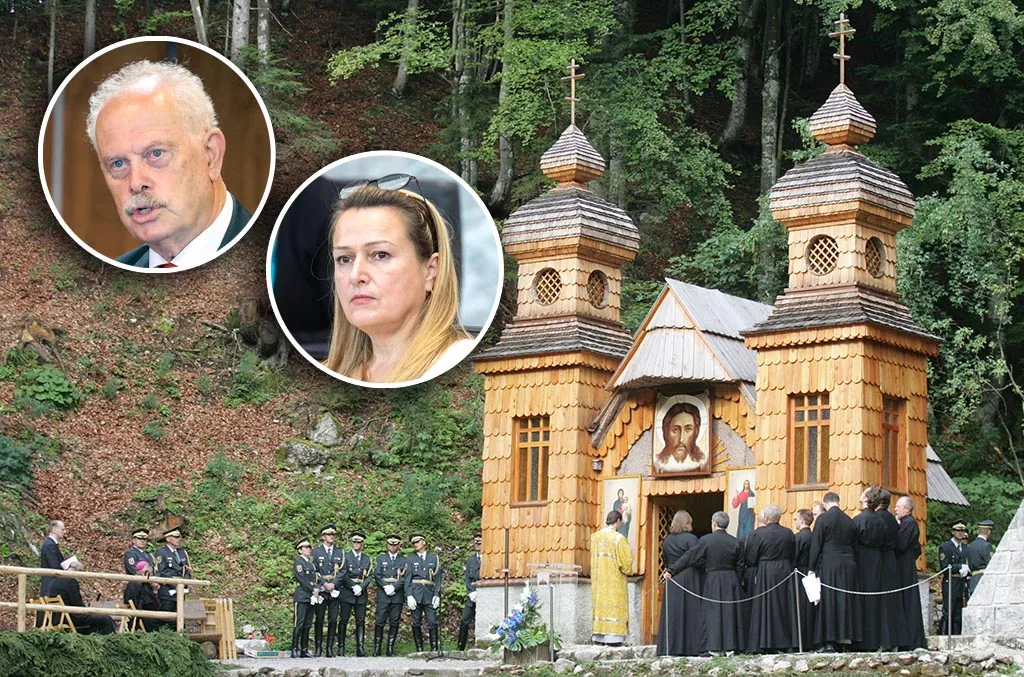The Russian Chapel (Ruska kapelica) has become a kind of litmus test of Slovenia’s attitude towards Russia. What was once a popular event, attended (for the most part) by the political crème de la crème of the left, has turned into a small commemoration attended by only a handful of former politicians and businessmen. Of the active politicians, only Zoran Janković and two members of the ruling Freedom Movement party (Gibanje Svoboda) attended the commemoration, while Karl Erjavec and Zmago Jelinčič also had to show up and stand in the front row.
The rest of the country’s political leadership is on holiday in Paris, watching the Olympic Games. For example, even the former owner of the “Russian Dacha” – the President of the country, Nataša Pirc Musar – was not present at the event. The last leader of the Communists, Milan Kučan, apologised “because of pre-planned commitments.” On the same day, he was speaking at the 83rd anniversary of the founding of the Pohorje Battalion, the media outlet Top News reports.
Instead of Prime Minister Golob, the second league of the Freedom Movement attended the commemoration. Lena Grgurevič and Miroslav Gregorčič were present at the reception in front of the Špik Hotel in Martuljek. Former ambassadors to Moscow, Primož Šeligo and Franci Demšar, were also seen at the event. Among the businesspeople, those with business interests in Russia were also present. One of them was Janez Škrabec, who, according to Slovenian pro-government media, lost his railway business when his business partner – Russian Railways (RZD) – found itself on the list of the European Union’s second package of sanctions. Also at the event was Krka’s President of the Management Board and Director-General, Jože Colarič, who, at the start of this year, was looking forward to expanding the company’s business in Russia.
What is also interesting is the presence of Zmago Jelinčič – Plemeniti at the event, who makes no secret of his affection for Russia. On the occasion of the event, he wrote on the social network X: “In the Slovenian National Party (Slovenska nacionalna stranka – SNS), we will never forget our common history, and we will never forget the Russian victims on our soil.” Karl Erjavec, who is apparently planning a return to politics, was also seen in the front row of the commemoration. He said in a statement to the media outlet Top News: “I have to say that many people are asking for me to return to politics. I am involved in some discussions, and I will decide in the autumn whether we will form a new party.”
Despite his statement, Erjavec seems to have more or less made up his mind. Just before he left the venue, he said goodbye to Jelinčič with the following words: “Zmago, have a nice day, see you at the next elections.”
Russia’s invasion of Ukraine splits the left
Both Erjavec and Jelinčič were disappointed by the low turnout of the domestic political summit. When the situation changes, Erjavec expects them to attend the commemoration again, while Jelinčič recalled that when Putin arrived, “our politicians were jostling over who would get closer to Putin, who would say what, who would shake his hand and so on”. He described all of these politicians as “dull and spineless.” Top News reports that some 400 people attended the commemoration for the dead Russian prisoners.
European attitudes towards Russia have, of course, changed with its illegal aggression against Ukraine. Russia has brought a war to the borders of the European Union, the likes of which we have not seen since the wars at the time of the break-up of Yugoslavia. Russia’s aim, in addition to the military subjugation of Ukraine, is to destabilise the West and to change the international order to make it more suitable for authoritarian states and their regimes. In this respect, the interests of Russia and China are the same. The invasion has markedly cooled relations between the Western countries. An abyss has opened up between Russia and the Western bloc, which at the same time represents a political opportunity for some and a business opportunity for others.
Ž. K.


